Entertainment One Films

If you like this company, let us know!
Foundation date 1 january 2003
Entertainment One Films, formerly Fox Lorber Films and Koch-Lorber Films, launched in February 2003, is an independent film distributor and DVD label based in New York. It is one of several subsidiaries of Entertainment One.
Entertainment One Films specializes primarily in critically acclaimed independent films, classics, documentaries and foreign cinema, and distributes films for both theatrical as well as DVD release. Their catalog includes foreign film classics such as La Dolce Vita, Peau d'Âne (Donkey Skin), The Umbrellas of Cherbourg, The Official Story, and Theorem as well as contemporary releases such as The Syrian Bride, Changing Times, Man Push Cart and the documentaries Our Brand Is Crisis and The Bridge.
Michael Koch and Richard Lorber are the Chairman/CEO and President, respectively.
Best films
Filmography of Entertainment One Films (40 films)
Distribution

In July (2000)
, 1h35Directed by Fatih Akın
Origin German
Genres Drama, Comedy, Adventure, Romance
Themes Transport films, Films about automobiles, Road movies
Actors Moritz Bleibtreu, Branka Katić, Christiane Paul, Birol Ünel, Mehmet Kurtuluş, Fatih Akın
At the beginning of his summer holiday, a somewhat naive trainee teacher Daniel (Moritz Bleibtreu) buys a ring from a stall run by a neighbor, the aspiring artist and street vendor Juli (in German, "Juli" would be not only the month July but also a common nickname for someone named "Julia"; Christiane Paul). The ring bears a Mayan sun symbol, which, according to Juli, has the power to lead him to the woman of his dreams, whom he will recognise by a similar sun symbol. As Juli has the ring's counterpart, and as she is in love with him, she invites Daniel to a party that evening, hoping that they will meet.

The Children of the Century (1999)
, 2h15Directed by Diane Kurys
Origin France
Genres Drama, Historical, Romance
Themes Films about writers
Actors Juliette Binoche, Benoît Magimel, Robin Renucci, Karin Viard, Stefano Dionisi, Isabelle Carré
The story begins as George Sand quits her marital home and arrives in Paris with her two children. Meanwhile, the young poet and dandy Alfred de Musset is busy making a name for himself both as a womaniser and a talented poet and critic. Sand and Musset first meet at a literary dinner and quickly recognise in each other a like minded love of literature. At first their relationship remains platonic, but soon the pair embark on a tumultuous affair that will lead them to Venice and the creation of their finest works of literature.

A Heart in Winter (1992)
, 1h45Directed by Claude Sautet
Origin France
Genres Drama, Musical, Romance
Themes Films about music and musicians, Films about classical music and musicians, Musical films, Buddy films, Violon
Actors Emmanuelle Béart, Daniel Auteuil, André Dussollier, Maurice Garrel, Élizabeth Bourgine, Brigitte Catillon
Made in 1992, Un Coeur En Hiver was French writer/director Claude Sautet's first feature film in four years. Daniel Auteuil plays lonely violin restorer Stephane, who is commissioned to produce an instrument for concert violinist Camille, who is the girlfriend of his married partner Maxime. Camille falls in love with Stephane, and leaves Maxime for him, only to find that he does not seem to return her feelings. The two men fight over her, but Camille eventually regains her composure.
 , 1h55
, 1h55Directed by Alain Corneau
Origin France
Genres Drama, Biography, Historical, Musical, Romance
Themes Films about music and musicians, Films about classical music and musicians, Musical films
Actors Jean-Pierre Marielle, Gérard Depardieu, Anne Brochet, Guillaume Depardieu, Michel Bouquet, Jean-Claude Dreyfus
Ageing court composer Marin Marais recalls his former master and un-equalled viol player, the jansenist Monsieur de Sainte Colombe. Sainte Colombe buried himself in his music after the death of his wife bringing up his two daughters on his own, and teaching them to be musicians, and playing in a consort with them for local noble audiences. His reputation reaching the court of Louis XIV, the king sent an envoy, Caignet, to request him to play at court. But Sainte Colombe sent the envoy away as well as the abbé Mathieu, and shut himself away in a cabin in his garden in order to perfect the art of viol playing.
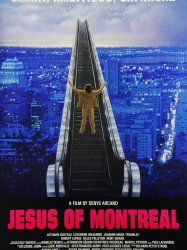
Jesus of Montreal (1989)
, 1h59Directed by Denys Arcand
Origin Canada
Genres Drama
Themes Films about religion, Théâtre, Portrayals of Jesus in film
Actors Lothaire Bluteau, Catherine Wilkening, Robert Lepage, Johanne-Marie Tremblay, Rémy Girard, Roy Dupuis
Le curé d'un sanctuaire et d'un lieu de pèlerinage (qui n'est pas nommé mais ressemble fortement à l'Oratoire Saint-Joseph) engage le jeune comédien Daniel, nouvellement de retour à Montréal, afin de monter une version rafraîchie de la Passion du Christ dans les jardins de ce lieu de culte. Ce dernier réunira une petite troupe de comédiens et en fera une interprétation libre, grandiose et sensible. Lors d'une représentation, des forces de l'ordre interviennent et la lourde croix tombe sur lui. Daniel est transporté en ambulance à «l'Hôpital St.-Marc», un endroit bondé et impitoyable, mais n'y reçoit aucun soin. Il quitte l'hôpital en état de choc et descend dans le métro. Inquiets, deux condisciples l'accompagnent... Daniel, en train de mourir, tient un dernier discours sur l'amour humain qui reste si inaccessible aux gens et qui finit par les tuer: «C'est le manque d'amour qui tue les gens», dit-il. Daniel perd encore connaissance dans le métro. Il est reçu avec humanité et professionnalisme à l'hôpital juif, mais il est trop tard. Ses condisciples donnent «son corps» aux fins de la transplantation. Hautement symbolique, un homme reçoit le cœur et une femme les yeux.
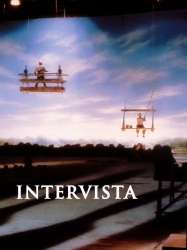
Intervista (1987)
, 1h45Directed by Federico Fellini
Origin Italie
Genres Drama, Comedy, Documentary
Themes Films about television
Actors Anita Ekberg, Marcello Mastroianni, Federico Fellini, Antonella Ponziani, Lara Wendel, Eva Grimaldi
Interviewed by a Japanese TV crew for a news report on his latest film, Fellini takes the viewer behind the scenes at Cinecittà. A nighttime set is prepared for a sequence that Fellini defines as “the prisoner’s dream” in which his hands grope for a way out of a dark tunnel. With advancing age and weight, Fellini is finding it difficult to escape by simply flying away but when he does, he contemplates Cinecittà from a great height.
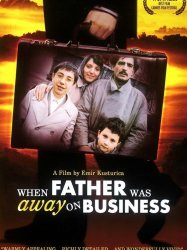 , 2h16
, 2h16Directed by Emir Kusturica
Genres Drama, Comedy-drama
Themes Films about families, Politique, Political films
Actors Miki Manojlović, Mirjana Karanović, Mustafa Nadarević, Mira Furlan, Davor Dujmović, Pavle Vuisić
The movie opens in June 1950 with a local neighbourhood drunk Čika Franjo serenading field workers. He sings Mexican songs (as it turns out, he does so out of self-preservation, figuring it's safer for him to steer clear of songs originating from either of the two dominant global powers — U.S.A. and U.S.S.R. — in the current climate of Cold War and Yugoslavia's paranoid repressive internal apparatus looking to identify and remove enemies of the state in the wake of the Tito-Stalin split) while local children, including Malik, climb trees and play around. The story is from the perspective of the boy, Malik, whose mother Sena tells him that his father is on a business trip. Malik is a chronic sleepwalker.
 , 1h28
, 1h28Directed by Wayne Wang
Origin USA
Genres Comedy
Actors Victor Wong, Cora Miao, Joan Chen, Amy Hill
A Chinese immigrant widow faces the New Year with apprehension after it was foretold that it would be the year she would die. All of the things she wants to do before she dies come into focus, including seeing her daughter married and visiting China one last time to pay her respects.
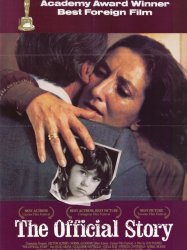
The Official Story (1985)
, 1h52Directed by Luis Puenzo
Origin Argentine
Genres Drama, Historical
Themes Seafaring films, Politique, Transport films, Political films, Films about Latin American military dictatorships
Actors Héctor Alterio, Norma Aleandro, Chunchuna Villafañe, Hugo Arana, Guillermo Battaglia, Pablo Rago
The film is set in Argentina in the 1980s, in the last years of the country's last military dictatorship, during which a campaign of State sponsored terrorism produced thousands of killings and torture of accused political leftists and innocents alike, who were buried in unmarked graves or became desaparecidos.
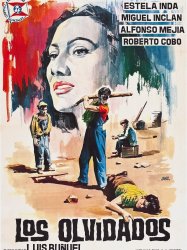
The Young and the Damned (1950)
, 1h20Directed by Luis Buñuel
Origin Mexique
Genres Drama, Crime
Themes Films about children, L'enfance marginalisée
Actors Stella Inda, Miguel Inclán, Alma Delia Fuentes, Ernesto Alonso, Víctor Manuel Mendoza, Victorio Blanco
The film is about a group of destitute children and their misfortunes in a Mexico City slum. El Jaibo escapes juvenile jail and reunites with the street gang that he leads. El Jaibo's gang attempts to rob a blind street musician. They fail at first, but later track him down, beat him, and destroy his instruments.
 Connection
Connection

